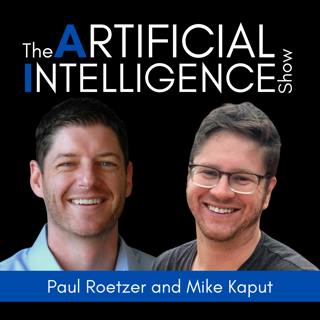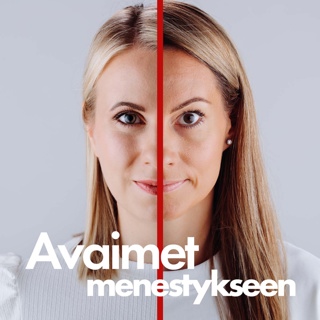
#34: Google Announces Bard, Microsoft Bing Is Now Powered by OpenAI, and Cohere In Talks to Raise Funding at a $6B Valuation
This week on The Marketing AI Show, Paul takes the show on the road—to San Francisco for Jasper’s GenAI Conference—while Mike is here in Cleveland. The big news is Bard, Bing, and a $6 Billion valuation. Suddenly, it’s ChatGPT against the world. Google responds to ChatGPT with its conversational AI tool, Bard. Google just announced an experimental conversational AI tool named Bard. Bard uses Google’s LaMDA language model to provide natural language answers to search queries. Think of it like ChatGPT, but backed by all the knowledge and information that Google’s search engine has cataloged over the last couple of decades. The announcement of Bard—a response to OpenAI and ChatGPT—prompted some critics to say the rollout was rushed, while others said they moved too slowly after ChatGPT took center stage in December and January. If you missed it, the demo didn’t quite go as planned. OpenAI gives Bing a new lease on life. Microsoft’s Bing is getting more attention now than its previous 14 years combined. The latest version of the search engine is powered by OpenAI, complete with ChatGPT-like conversational capabilities. Bing can now respond to searches and queries in natural language, like ChatGPT, and use up-to-date information, like Google’s Bard release. Kevin Roose, technology writer at the New York Times, took the new capabilities for a test drive and was impressed. Will Bing and OpenAI make Edge, Microsoft’s browser, interesting for customers? Cohere answers the call for ChatGPT for the enterprise. Major AI startup, Cohere, is in talks to raise money at a $6 billion valuation and bring ChatGPT-like capabilities to businesses. Established in 2019 by former researchers at Alphabet/Google, Cohere is a big player in the world of AI. The foundational language AI technology allows businesses to incorporate large language models into their work. The group is now in talks to raise hundreds of millions at a $6 billion valuation, reports Reuters, as the AI arms race heats up. Cohere is no stranger to the VC world, having already raised $170 million from venture capital funds and AI leaders like Geoff Hinton and Fei-Fei Li. The appeal is the company’s focus on building for the enterprise, with an emphasis on real-world applications for their technology. Listen to this week’s episode on your favorite podcast player, and be sure to explore the links below for more thoughts and perspectives on these important topics.
14 Helmi 202340min

#33: The Responsible AI Manifesto, the Meta AI Tool That Might Be Your New AI Assistant, and the First Marketing AI Job Listing
This week on The Marketing AI Show, the guys discuss responsible AI, do a deeper dive into Meta’s CICERO (after a short discussion in Ep. 25 of the podcast), and the job posting Mike came across for an AI Marketing Specialist. Is this the first? A manifesto for responsible AI—for companies to use for themselves Last week on the Marketing AI Institute blog, you may have seen our Responsible AI Manifesto for Marketing and Business. In it, Paul lays out the 12 principles that we’re using to guide us in the responsible use of AI within our organization. From this blog post and Paul’s subsequent LinkedIn post, we received feedback, comments, and some praise on taking this step. Much of the feedback asked if we had considered a certain principle, or questioned one of the bullet points in the article. On the podcast, Paul and Mike walk through each principle and break down their thoughts and how businesses and marketing leaders can use this document to create a manifesto of their own. What is CICERO…and what are the implications? In November 2022, Meta AI introduced CICERO, the first AI to play at a human level in Diplomacy, a strategy game that requires building trust, negotiating, and cooperating with multiple players…essentially trying to make it fundamentally honest and collaborative. Is there a place for CICERO in business and life? Will AI assistants be able to help us negotiate and navigate through life? Many of these questions touch on conversations Paul has had, and posts he’s shared: there’s a much bigger story to these AI developments, and the implications for business and society are huge. The first (that we’ve seen) AI marketing job listing Tomorrow.io’s CMO Dan Slagen shared his company’s most recent job posting for an AI Marketing Specialist. The good news is that this is a junior role, and years of experience aren’t needed. It’s interesting and exciting that one function of this role will be to stay up to date on the latest AI developments and learn to pilot and scale AI programs as they learn. What a great way for businesses to stay ahead of the AI curve and bring on interested, enthusiastic talent. This podcast episode ends with rapid-fire questions talking about Big Tech’s Q1 earnings calls, updates on Microsoft and Bing, ChatGPT breaking records, and Runway Gen-1’s big announcement. Listen to this week’s episode on your favorite podcast player and be sure to explore the links below for more thoughts and perspective on these important topics.
7 Helmi 20231h

#32: AI Writing Mega-Episode — The Future of Writing in the Age of AI, AI Writing Tools: Capabilities, Limitations, and Concerns, and How AI Will Change Writing Careers Producer: MAII or Music Radio Creative
This week on The Marketing AI Show, all three topics focus on AI and writing. This mega-episode brings to the surface many of the questions we’re hearing from our community. AI writing tools are rapidly transforming the art and science of storytelling, and in the process, they're disrupting writing as we know it. Everyone at every size company now has access to powerful and affordable AI technologies that are redefining writing and forcing companies to reimagine content teams and strategies to remain competitive. We can already 10X our content output, like ads, articles, blog posts, emails, and more, with today’s AI—and it’s growing more powerful by the day. This has created massive uncertainty for writers, brands, agencies, and media companies. And it’s made it essential that writers, editors, and content leaders take action to understand and apply AI. Today’s podcast episode is a mega-episode on AI writing and the impact it will have on writers and writing as we know it. Funding is flooding the space, and we’re already seeing media businesses incorporate AI writing into their business models—with mixed results. But these businesses are moving forward anyway. It’s important for marketing and business leaders to remember that a tool like ChatGPT is just the tip of the AI iceberg for marketers and business leaders. It's the shiny object that's captured everyone's attention, and rightly so. So what is the future of AI and writing? The second topic on AI and writing touches on AI writing tools. These tools can enable all sorts of highly valuable use cases across writing functions. Used intelligently, these tools can dramatically improve your productivity and performance as a writer. On the other hand, they also have plenty of limitations that any writer using these tools must be able to identify if they want to succeed at AI-powered writing. How should these tools be used by individuals and brands? We believe that understanding the very real issues raised by this technology is key to adopting it in a responsible way. And finally, how will AI change writing careers? AI is going to have a major impact on the careers and skills of writers and content professionals. These more intelligent tools are already opening up new frontiers of creativity, productivity, and writing at scale for savvy professionals. But they’re also changing the nature of writing work and business models, and writers and companies will need to adapt accordingly. Mike and Paul invest these 45 minutes in helping listeners understand what these new developments mean, providing context on what marketers and business leaders can do, need to consider, and how to adapt. Listen to this week’s episode on your favorite podcast player and be sure to explore the links below for more thoughts and perspective on these important topics.
1 Helmi 202346min

#31: 22-Year Old Creates ChatGPT Detector, Google Gears Up for AI Arms Race, and the Dark Side of AI Training
This week in AI news, we talk about education, an AI arms race, and a very dark side of AI training. First up, A 22-year-old has created an app that claims to detect text generated by ChatGPT. The tool is called GPTZero, and it was created by Edward Tian, a senior at Princeton University, to combat the misuse of AI technology. Tian believes AI is at an inflection point and has the potential to be "incredible" but also "terrifying." The app works by looking at two variables in a text: “perplexity” and “burstiness,” and it assigns each variable a score. First, the app measures its familiarity with the text presented, given what it has seen during training. The less familiar it is, then, the higher the text's perplexity is, meaning it's more likely to be human-written, according to Tian. It then measures burstiness by scanning the text to see how variable it is; if it varies a lot, it's likely to be human-written. Tian's app aims to incentivize originality in human writing and prevent the "Hallmarkization of everything" where all written communication becomes formulaic and wit. Paul and Mike discuss what this means, ethical issues, and opportunities and challenges for this tool. Next up, this week, Google staked its position in the AI arms race by announcing its commitment to dozens of new advancements in 2023. The New York Times reported that Google’s founders, Larry Page and Sergey Brin, were called in to refine the company’s AI strategy in response to threats like ChatGPT and major players like Microsoft, who just formally announced its multi-billion-dollar partnership with OpenAI. According to the Times, Google now intends to launch more than 20 new AI-powered products and demonstrate a version of its search engine with chatbot features this year. And finally, a new investigative report reveals the dark side of training AI models. A recent investigation by Time found that OpenAI used outsourced Kenyan laborers earning less than $2 per hour to make ChatGPT less toxic. That included having workers review and label large amounts of disturbing text, including violent, sexist, and racist remarks, to teach the platform what constituted unsafe outputs. Some workers reported serious mental trauma resulting from the work, which was eventually suspended by OpenAI and Sama, the outsourcing company involved, due to the damage to workers and the negative press. As Paul put it in a recent LinkedIn post, this raises larger questions about how AI is trained: “There are people, often in faraway places, whose livelihoods depend on them exploring the darkest sides of humanity every day. Their jobs are to read, review and watch content no one should have to see.”
25 Tammi 202341min

#30: ChatGPT Disrupts Education, Generative AI Gets Sued, and OpenAI Now Available from Microsoft
Generative AI has so many benefits for marketers. But with the rapid pace of adoption—often with little to no oversight–-issues are quickly arising. From educational concerns to legal ramifications, Paul and Mike discuss this on this week’s Marketing AI Show podcast episode. Also, stick around for an update on the developments between OpenAI and Microsoft. First up, higher education has been rocked by ChatGPT. Professors and educators need to rethink assignments when it comes to essay writing, take-home tests might become a thing of the past, oral exams will be on the rise, and identifying plagiarism has a new twist. Schools are banning the use of ChatGPT in assignments, but how can they truly know how the assignment was completed? And should educators teach students how AI can augment their learning? One student has created a tool to identify content generated by ChatGPT, but is that really the solution? Next, generative AI is having some legal troubles. Stability AI has received formal notification of impending litigation. Intellectual property, derivative works, and copyright violations are all discussion points as these technologies advance and learn. As the line isn’t clear, and precedent has not been established, the court cases will continue to mount. GitHub and Midjourney are in the thick of this as well. Once fast to market, Reuters reported that Sam Altman says OpenAI’s GPT-4 will launch only when they can do it safely & responsibly. “In general we are going to release technology much more slowly than people would like. We’re going to sit on it for much longer…” That’s a good thing, but is it too late? Finally, last week in episode 29, we discussed Microsoft and OpenAI. On Microsoft Azure’s website, they announce, “Today, we are excited to announce the general availability of Azure OpenAI Service as part of Microsoft’s continued commitment to democratizing AI, and ongoing partnership with OpenAI.” As part of this, DALL-E 2 and ChatGPT can be integrated into their clients’ cloud apps. Developers are currently required to apply for access, and have to describe their intended use cases and applications before they can get access. Catch up on the latest news and think about these developments and what it means to you and your business.. Listen to the podcast below or in your favorite podcast player.
18 Tammi 202347min

#29: Microsoft May Invest $10B in OpenAI, AI Clones Voices, and AI Disrupts Marketing Agencies
It’s been another exciting week in the world of artificial intelligence. What does it mean for marketers? The guys break it down on The Marketing AI Show. First up, Paul and Mike have hypothesized about this, and now the speculation has come true. According to a scoop from The Information, Microsoft plans to incorporate OpenAI’s ChatGPT into its Bing search engine. Today, Google handles more than 80% of search traffic. In comparison, Bing processed about 9% of worldwide searches in 2022. Rumor has it Microsoft is making a major play into using ChatGPT-like AI answers in search. Not to mention, this could open the door to using ChatGPT in Word and other Office products. Just days after the scoop, Semafor reported that Microsoft has been in talks to invest up to $10 billion in OpenAI. The funding would eventually give Microsoft a 49% stake in the company, valuing it at $29 billion total. Next, Microsoft just announced a major milestone development in voice AI. The company revealed an AI model called VALL-E that can synthesize anyone’s voice using just 3 seconds of audio. Microsoft shared some audio samples, and simply put, Mike Kaput said they are “pretty stunning.” Based on just a few seconds of a person saying a random sentence, VALL-E can create completely new speech from scratch in their exact voice. The implications of hyper-realistic voice AI technology are widespread and mind-blowing. Finally, Paul’s recent LinkedIn post on AI disrupting marketing agencies got a lot of attention. In it, Paul said, “Artificial intelligence is going to disrupt a lot of marketing agencies in 2023. Some will seize the opportunity and create enormous value for themselves and their clients, while many will be obsoleted. These laggards won’t all die off overnight, but their relevance and value will quickly fade, and their clients (and people) will move on.” Hear Paul’s motivation for writing the post and the conversation that ensues. As advancements become more prevalent, conversations have become more important for marketers and business leaders. Tune in to see how you can act on these developments. Listen to the podcast below or in your favorite podcast player.
13 Tammi 202343min

#28: The AI Inflection Point Is Here
At Marketing AI Institute, we are seeing strong quantitative and qualitative evidence that indicates we are at an AI inflection point, where the technology begins to go fully mainstream in 2023—with profound effects on…well…everything. For years, we have hypothesized that AI has the power to change just about everything in marketing, business, the economy, and society at large. In 2022, we saw that hypothesis confirmed thanks to an explosion of AI capabilities and technologies driven by the stunning power of generative AI tools like ChatGPT. In a matter of months, even the brightest minds in AI have been surprised by how quickly and effectively AI tools have reshaped what we thought possible in marketing and business. We’re going to devote today’s episode to outlining why we think we’re about to enter a golden age of AI progress that will reshape the work of every professional in every industry.
4 Tammi 20231h

#27: Head-to-Head AI Writing Tools Test, Will ChatGPT Replace Google, and MyHeritage AI Time Machine
Mike and Paul are back for another episode of The Marketing AI Show. Paul ran a head-to-head test of AI writing tools and posted about it on Twitter and LinkedIn. On both platforms, the posts gained traction and good feedback from our community and from technology companies. In the experiment, Paul ran the same three prompts/use cases through a handful of different tools. The tools were OpenAI’s ChatGPT and their Playground functionality; Cohere; Jasper; Writer; and HyperWrite. It’s an interesting case study showing AI in action. Next up, we’ve all seen plenty of examples online, many impressive, of what ChatGPT can do. In addition to writing text, ChatGPT is generating outlines, doing research, answering complex questions, and surfacing information. This has led to some serious online conversations asking the following question: Will ChatGPT replace Google search? Today, plenty of ChatGPT’s responses are inaccurate and don’t contain citations, but some people are already imagining a future where we no longer use a Google search to find information. The third topic of this week’s podcast is MyHeritage. MyHeritage is a discovery platform that helps you find people related to you. The company just released a free tool called AI Time Machine. You upload photos of yourself, then the AI creates hyper-realistic avatars of you in different historical time periods, from prehistoric times to Ancient Egypt to modern times. It’s a timely twist on hyper-popular photo apps like Lensa that are getting a lot of buzz.
21 Joulu 202240min





















